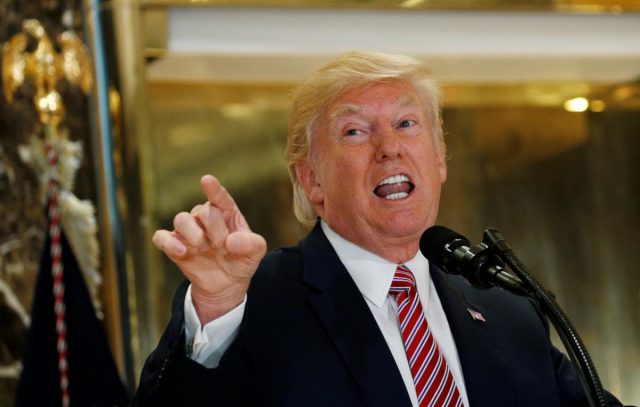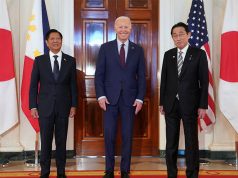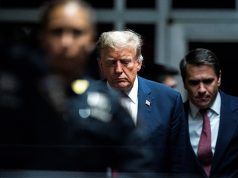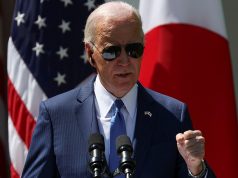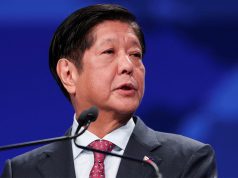WASHINGTON/SEOUL — The White House on Wednesday defended Donald Trump’s tweet about the size of his nuclear button, saying Americans should be concerned about the North Korean leader’s mental fitness, not their president‘s.
On Tuesday, Trump responded to a New Year’s Day speech in which North Korean leader Kim Jong Un warned he had a nuclear button on his desk by saying that his nuclear button “is a much bigger & more powerful one than his, and my Button works!”
The tweet provoked strong criticism, especially from Trump’s Democratic opponents, and former Vice President Joe Biden called it dangerously cavalier.
Asked whether Americans should be concerned about the president’s mental fitness after he appeared to be speaking so lightly about nuclear threats, White House spokeswoman Sara Sanders told a regular news briefing:
“The president and the people of this country should be concerned about the mental fitness of the leader of North Korea.
“He’s made repeated threats, he’s tested missiles time and time again for years, and this is a president who’s not going to cower down and who’s not going to be weak and is going to make sure that he does what he’s promised to do and that is stand up and protect the American people.”
Trump and Kim have exchanged repeated insults in recent months in a crisis over North Korea’s program to develop nuclear-tipped missiles capable of reaching the United States, raising alarm worldwide.
Trump has at times appeared to dismiss the prospect of a diplomatic solution and both sides have threatened to destroy each other.
Former Vice President Joe Biden said Trump had shown “really poor judgment.”
“The only war that is worse than one that’s intended, is one that is not intended,” Biden was quoted as saying by CNN. “This is not a game. This is not about, you know, can I puff my chest out.”
“The United States has a role in the world that the world has come to expect. I think the president is much, much too cavalier. And it’s dangerous.”
Senator Edward Markey, the top Democrat on the Senate’s East Asia Subcommittee, said Trump’s tweet “bordered on presidential malpractice, needlessly deepening a crisis and squandering a fresh opportunity to attempt diplomacy.”
In his New Year speech, Kim warned that the entire United States was in range of North Korea nuclear missiles and added: “A nuclear button is always on my desk. This is reality, not a threat.”
Kim said his country would focus in the coming year on mass producing nuclear warheads and ballistic missiles for operational deployment, but added that these would be used only if North Korea’s security was threatened.
U.S. Vice President Mike Pence told the Voice of America Trump was making clear that “America will not be bullied, America will not be threatened.”
He said that while all options remained on the table, there was the opportunity for a peaceable solution to the crisis if “North Korea will abandon their nuclear and ballistic missile ambitions, if they will dismantle those programs.”
Hotline reopened
In his address, Kim also said he was open to speaking with U.S. ally South Korea and would consider sending a delegation to the Winter Olympics to be held in South Korea in February.
U.S. officials have responded coolly to this overture and the State Department said North Korea “might be trying to drive a wedge” between Washington and Seoul.
On Tuesday, Nikki Haley, the U.S. ambassador to the United Nations, said Washington would not take any talks between North and South Korea seriously if they did not contribute to denuclearizing North Korea.
Haley also said Washington was hearing reports that Pyongyang might be preparing to fire another missile and warned of even tougher steps in response if it did so.
On Tuesday, Seoul responded to Kim by proposing high-level discussions at the heavily armed Korean border next week, and on Wednesday North Korea reopened a border hotline that had been closed since February 2016.
South Korean officials at the border received a call from the North at 0630 GMT and officials on both sides conducted a conversation for about 20 minutes, South Korea’s unification ministry said. It did not disclose the content of the discussion.
There was no immediate U.S. comment on the reopening of the hotline, although a State Department spokeswoman, Katina Adams, said Washington remained in close contact with Seoul “about a unified response to North Korea.”
She said that as South Korea President Moon Jae-in had stated, “‘the improvement of relations between North and South Korea cannot advance separately from resolving North Korea’s nuclear program.’”
The reopening of the hotline came hours after the tweet from Trump, who has repeatedly mocked Kim as “Little Rocket Man”.
Kim’s New Year’s Day speech followed a steep increase in missile launches by North Korea in 2017, as well as its sixth and most powerful nuclear test.
North Korea’s KCNA news agency quoted Ri Son Gwon, chairman of North Korea’s Committee for the Peaceful Reunification of the Fatherland, as saying talks with South Korea would aim to establish formal dialogue about sending a North Korean delegation to the Olympics.
“We will try to keep close communications with the south Korean side from sincere stand (sic) and honest attitude, true to the intention of our supreme leadership, and deal with the practical matters related to the dispatch of our delegation,” he said.
Chinese Foreign Ministry spokesman Geng Shuang said both sides should seize the Olympics as an opportunity to improve ties and make concrete efforts toward alleviating tension.

